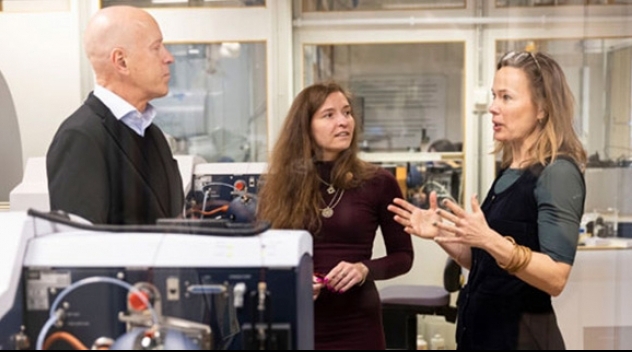MSI Lab Per Andrén joins SciLifeLab Spatial Omics
With the launch of national resource Spatial Omics, SciLifeLab consolidates Sweden's advanced position in one of the hottest fields of science. "This gives us the capacity to extract even more detailed knowledge from cell and tissue analyses," states Professor Per Andrén, whose MSI environment is recruited to the new infrastructure.
Spatial Omics is a relatively young area of technology that is quickly becoming a very important part of Life Science. With powerful instruments and large-scale cell analyses in tissue samples, data are generated that constitute key tools for research in fields such as cancer, immunology and neurology. Sweden holds a prominent position in this field and now SciLifeLab is taking the next step with the launch of a national resource for Spatial Omics. The new infrastructure brings together several leading environments, among them Per Andréns' laboratory for Mass Spectrometry Imaging, MSI, at Uppsala University.
“Spatial Omics combines different technologies that together generate a wide range of molecular information, and this new collaboration will give us the capacity to extract extremely detailed molecular knowledge. Our goal is to be able to image individual cells in tissue sections, identify how they are placed in relation to each other and to define their individual tasks and status,” says Per Andrén, Professor of Mass Spectrometry Imaging.
SciLifeLab Spatial Mass Spectrometry is part of the new Spatial and Single Cell Biology platform. Using state-of-the-art instruments, the aim it to automate both the processing and the analysis of samples. A development that will enable both upscaling of quantities and increase the precision in data output. A joint application from four of the units in the platform recently resulted in 29 million SEK funding, resources that are currently being invested in addition to existing instrumentation and expertise.
“Our laboratory in Uppsala is already one of the world's leader in MSI with tools so powerful that the information they generate can be so detailed and complex that they are at times difficult to comprehend. We are now preparing the acquisition of instruments that will further improve spatial resolution and strengthen our capacity to distinguish molecules of identical weight. In parallel, we have initiated recruitments in software development and bioinformatics. In 2022, we expect to have everything in place,” says Per Andrén.
The new infrastructure is primarily a resource for Swedish academic research, but assignments from industry and abroad can be accepted to a certain extent. With the increased capacity to process information, SciLifeLab Spatial Omics will remove the bottleneck that often occur when projects are ready to upscale their production of data. In the foreseeable future, the ambition is to contribute to in-depth understanding of disease mechanisms, more sensitive diagnostics, new drugs and better treatment strategies.
“Our facility is already internationally sought after with a waiting list for our services. Nevertheless, SciLifeLab provides us now with a completely new platform to visualize our facility and to identify new projects where we can contribute to maximise the outcome of good and relevant research. We also have great faith in the synergy effects we identify in a common infrastructure, which will hopefully in the long run attract even more researchers to conduct their studies in Sweden.”
Magnus Alsne
Facts SciLifeLab Spatial Omics
- Offers access to technology for spatially resolved RNA, protein and small molecule analyses of histological tissue sections.
- Comprises expertise in
In Situ Sequencing
Spatial Proteomics
Advanced FISH Technologies
Spatial Mass Spectrometry

